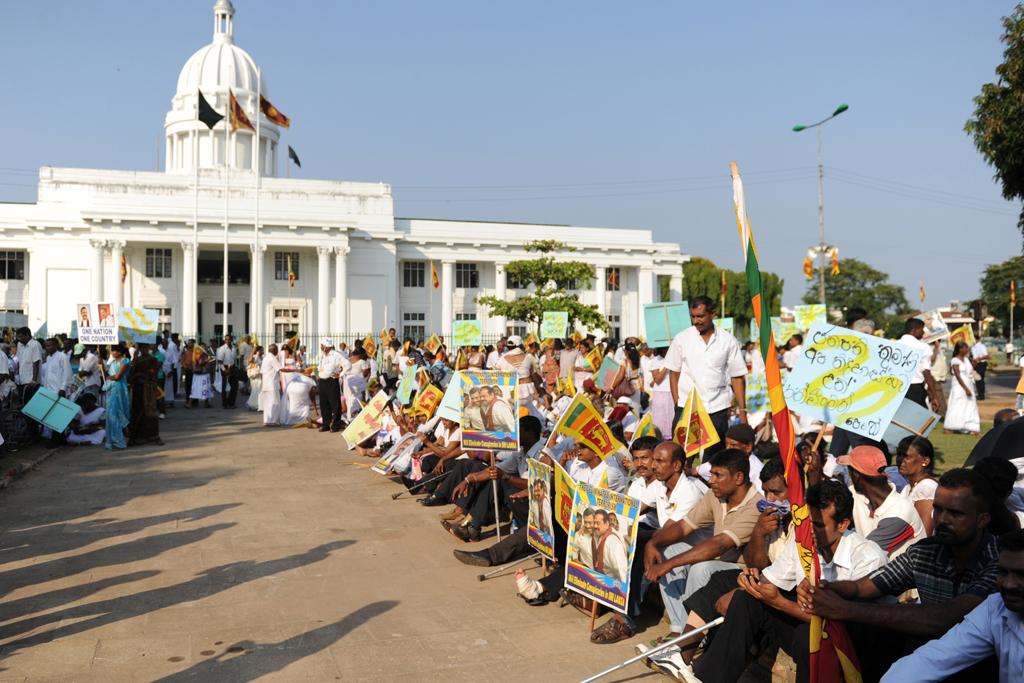UNHRC: Sri Lanka should punish war crimes
Families of Sri Lankan disabled soldiers express their solidarity with the government during a demonstration in Colombo on March 22, 2012. Protestors were against a US sponsored resolution at the UN Human Rights Council that urged credible probe against alleged violations during the final days of the war against Tamil Tiger separatists in 2009. The US-led resolution was adopted with 24 votes in favour, 15 against and eight abstentions.
The United Nations Human Rights Council passed a resolution on Thursday urging the Sri Lankan government to investigate alleged war crimes committed during the civil war fought against the Tamil Tiger separatists in 2009, according to the AFP.
The United States-sponsored resolution said Colombo had three years to launch its own investigations into abuses of international humanitarian law, but "given the lack of action… it is appropriate" for the 47-member council to urge action on the issue.
The BBC reported that the resolution passed with 24 votes in favor, 15 against and eight abstentions. Sri Lanka's mission to the UN called the vote a "selective and arbitrary process."
In a statement, Sri Lanka said, "The obvious reality is that voting at the Human Rights Council is now determined not by the merits of a particular issue but by strategic alliances and domestic political issues in other countries which have nothing to do with the subject matter of a Resolution," according to the BBC. The US, Belgium and India backed the resolution while China and Russia were among the countries that sided with Sri Lanka.
More on GlobalPost: Sri Lanka: India gives nod to war crimes vote at UN Human Rights Council
The resolution went forward despite heavy lobbying against it by a 70 person team from Colombo, said Reuters. The resolution called for the government in Sri Lanka to implement recommendations from an official Sri Lankan probe, which called for the prosecution of soldiers found guilty of misconduct.
US Secretary of State Hillary Clinton hailed the passage of the resolution, saying it "encourages the government of Sri Lanka to continue on the path toward reconciliation following 27 years of civil war," according to the AFP.
Human rights groups estimate that up to 40,000 civilians died in the bloody final months of the Sri Lankan government's military campaign to crush the Tamil Tiger uprising which had lasted for decades. The UN estimates that 100,000 people died between 1972 and 2009 in the ethnic conflict in Sri Lanka.
Sri Lanka's long time ally, India, backing the resolution is likely to cause diplomatic problems between the countries. Indian Prime Minister Manmohan Singh said that while India did not want to infringe on Sri Lanka's sovereignty but "concerns should be expressed so that Tamil people can get justice and lead a life of dignity," according to The Times of India.
More on GlobalPost: Promises, pitfalls await investors in Burma’s frontier economy
The story you just read is accessible and free to all because thousands of listeners and readers contribute to our nonprofit newsroom. We go deep to bring you the human-centered international reporting that you know you can trust. To do this work and to do it well, we rely on the support of our listeners. If you appreciated our coverage this year, if there was a story that made you pause or a song that moved you, would you consider making a gift to sustain our work through 2024 and beyond?
